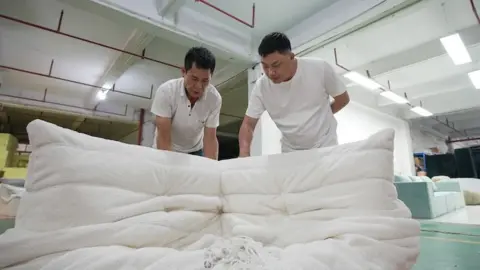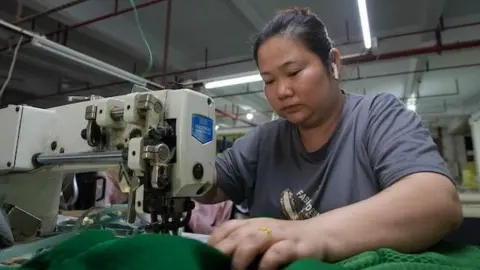The BBC was told that several of these workers will sleep in the park to save money. Many of them travel to Foshan from their home towns, which can be hundreds of kilometres away.
Several nearby hostels offer rooms for 20 yuan a night, which can be at least an hour’s pay. Many will want to pocket whatever they earn to send it back to their families.
This is the picture of China that President Trump’s team have tried to present – one of sluggish growth, rising unemployment and a chronic housing crisis.
“We’re not looking to hurt China,” Mr Trump said after the trade agreement was announced, while adding that China was “being hurt very badly”.
“They were closing up factories. They were having a lot of unrest, and they were very happy to be able to do something with us.”
This may be overstating Beijing’s economic woes. This country is still leading the world when it comes to the production of electric vehicles and solar panels, and it is making significant headway in artificial intelligence technology.
Officials in China have also continued to stress this country can take the pain of an economic war. But it is being keenly felt by some on the frontline and that may be part of why Beijing has started talking to the US.
 BBC/Joyce Liu
BBC/Joyce LiuThis latest “ceasefire” has prompted a rush of orders between the two countries as businesses wonder if it can last.
He Ke, or HK to his American clients, has called his workers back from their home towns to restart his sofa business, Gongyuan Furniture.
It ground to a halt even before Mr Trump’s tariffs hit 145%.
“We had a day off straightaway,” said Mr He. “Once the tariffs hit 50%, we had already come to a standstill. When they hit 145%, we certainly could not do business. It was just not possible.”
His production line with around 200 workers once took up all four floors of the building.
Since the Covid pandemic, he has only needed one floor and around 40 staff. But he still has the odd high-profile client – he claims Elon Musk sits on one of his sofas.
 BBC/Joyce Liu
BBC/Joyce LiuSome workers have already returned and are lifting a soft chair onto a compressor machine to get it ready to box and ship.
Sewing machines hum in the background as workers stitch fabric into the right shape to cover memory foam cushions.
Mr He says he has seen many changes in Foshan since he started making sofas in 2013.
“We feel that the global economy is not good. The domestic economy has also been hit and this affects the life of people here. In the past, when we went out to spend money, we spent a lot of money. We did not think about whether the price was high or cheap. We will buy it as long as we like it. Now, when we want to buy a relatively expensive things, we have to think twice, because the money is not easy to earn.”
Like Mr Wang and his air fryers, Mr He also says he is looking at diversifying his sales away from the US, but he has hope that the world’s two biggest economies can come to an agreement in the next 90 days.
“I am just a small businessman. But I do understand that the game between these two countries is temporary. I think if they want to survive with each other for a long time, they will definitely sit down and talk things over.”